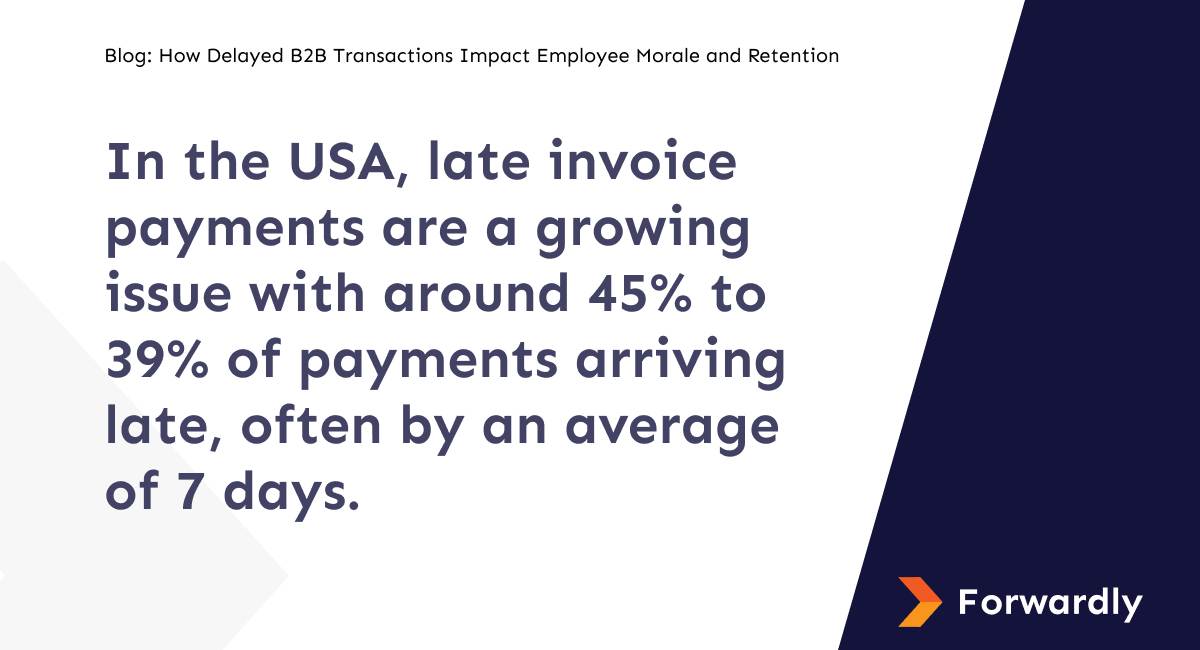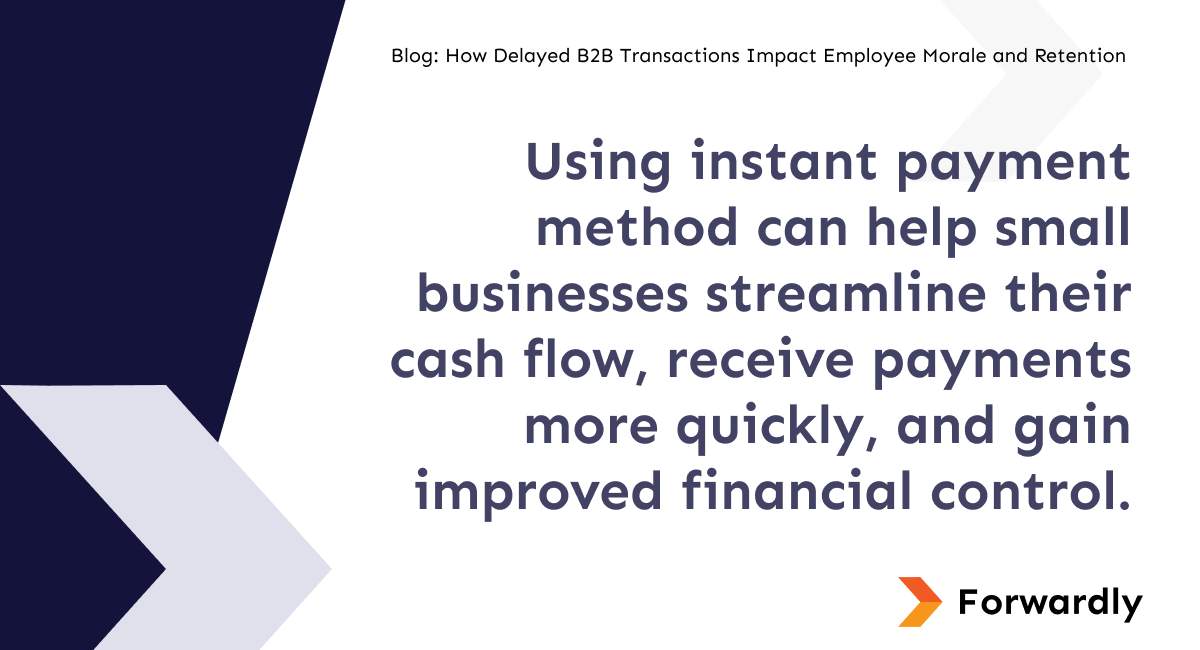When you’re running a business, delays can be a big problem. Small businesses, in particular, can suffer a lot when transactions are delayed. This can create a chain reaction that affects how the business runs, its money, and how employees feel about their work. In the USA, late invoice payments are a growing issue, with around 45% to 39% of payments arriving late, often by an average of 7 days. In this article, we’ll understand the causes of these delays and explore their impact on the company’s workforce.

Common delay factors
Understanding the reasons behind delayed B2B transactions is important for small businesses looking to mitigate the impact of delays. Factors such as disputes over invoices, lengthy approval processes, cash flow issues on the buyer’s end, traditional payment methods or even administrative errors can contribute to delays.
The use of traditional payment methods, including checks, ACH transfers, and credit cards, stands as the primary culprit for the delays often seen in B2B payments. ACH transfers may take up to five days, checks can extend to a lengthy two-week processing period in certain cases, and even credit card transactions may require several days for processing. In stark contrast, instant business payments offer a swift solution, with funds landing in your account within seconds.
How delays create chaos
When something gets delayed, it can set off a chain reaction of issues, much like a row of falling dominoes. Just like those falling dominoes, delays in business can lead to a cascade of problems. Delayed B2B transactions can harm employee morale and retention in several ways:
Burden on the AR department: Your accounts receivable team is on the front lines, dealing with delayed payments. Their responsibilities include invoice processing, following up with clients, and ensuring that payments are received on time. When B2B transactions are delayed, it places an added burden on the AR team, increasing their workload and stress levels. This can lead to employee dissatisfaction and burnout.
Financial stress: Cash flow disruptions can lead to difficulties in meeting operational expenses, paying suppliers, and investing in growth opportunities. This financial stress can further affect the morale of employees, as they may worry about job security and the company’s ability to meet its financial obligations. According to a study, 76% of people reported workplace stress harms their mental health, leading to issues like depression and anxiety. So, when financial stress piles up due to delayed payments, it’s not just about numbers; it’s about people’s well-being too.
Workflows disruption and resource challenges: A single delayed payment can disrupt carefully planned workflows within an organization. For example, a delay in receiving payment for completed work can lead to resource allocation challenges. This might mean that employees must be reassigned to other tasks or that projects need to be put on hold. These disruptions not only affect productivity but also contribute to frustration among employees who are trying to meet their own deadlines.
Employee satisfaction decline and inter-team impact: Your employees are your most valuable asset. When employees continually face the challenges and uncertainties caused by delayed transactions, their job satisfaction can decline. Inter-team dynamics may also be negatively impacted as teams point fingers or blame one another for delays, further eroding workplace harmony.
Work-life balance disturbance: Maintaining a balance between work and personal life is crucial for employee well-being. But when B2B transactions face delays, employees often work longer hours to resolve the issues, leading to stress and burnout. According to Statista, 72% of job seekers value work-life balance when considering jobs, so this disruption can impact job satisfaction and retention.
Company stability fear: Delayed transactions can create a sense of instability among employees. They may become apprehensive about the company’s financial health and its ability to weather such challenges. This fear can push them to start looking for more secure job options elsewhere. According to a survey, 15% of U.S. workers currently feel like they could lose their jobs, so this fear of instability is a real concern for many employees.
Missed opportunities and growth hindrance: When payments are delayed, it can hinder a company’s ability to invest in new ventures, expand into new markets, or make strategic acquisitions. As a result, employees may feel frustrated that their career growth prospects are limited, and the company’s long-term stability may be at risk. In fact, a workplace survey found that 94% of employees said they’d stick around if their company helped them learn and grow. When delays get in the way of growth, it’s not just the company that suffers; employees are affected too.
Reducing late payments: A proactive approach
One way to make B2B transactions quicker is to use instant payments. Instant payments, aptly named for their quick processing, leverage specialized payment networks developed by The Clearing House (RTP®) and The Federal Reserve (FedNow® Service).
Transactions processed through these real-time networks grant swift access to funds, enabling immediate and seamless transactions. Notably, these instant payment systems operate round-the-clock every day of the year, including holidays. Both instant payment networks offer faster, highly reliable, and secure payment options, effectively removing the inefficiencies associated with traditional payment methods. FedNow also adheres to the ISO 20022 global standard, ensuring the transmission of information-rich messages.
Using instant payment methods can help small businesses streamline their cash flow, receive payments more quickly, and gain improved financial control. This, in turn, ensures that employee morale remains high and employee retention rates are maintained.

Meet Forwardly- Your payments partner for B2B transactions
Forwardly provides a user-friendly cash flow management tool that comes complete with an all-in-one payment solution, allowing for fast and secure transactions directly within the platform. Forwardly currently supports The Clearing House’s RTP network and FedNow from the Federal Reserve.
Our instant payment feature ensures that transactions are completed in just 60 seconds, no matter the time or day, all year round. What’s more, you can enjoy significant savings with up to 80% lower processing fees compared to traditional methods, and there’s no pesky monthly subscription fee to worry about.
Plus, set up auto payments for your clients and never miss a payment from them again. Ready to improve your finances? Sign up with Forwardly today!
 Back to Blog
Back to Blog


